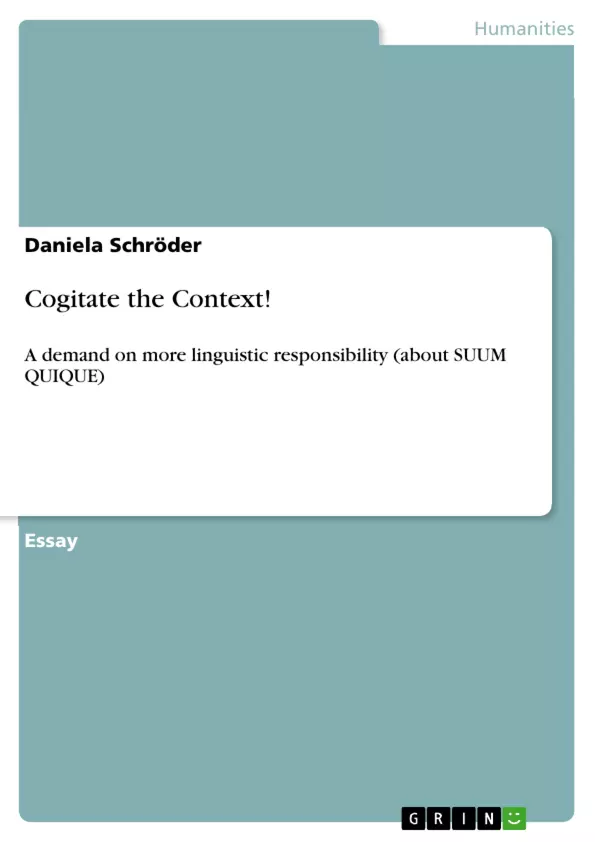Maybe the ad writers did not appreciate the historical context while using the phrase SUUM CUIQUE in the german translation „Jedem das Seine“ to promote a new coffee for their clients ESSO and TCHIBO in 2009. Maybe they did not know that it was used as a redicule of the jewish prisoner in the KZ Buchenwald, in whose gate these words were engraved.
But „Ignorance is no defense“ - to answer with another phrase – and the accountable marketing people had to stop the campain immediately when the protests started (spiegel.de 2009).
For 2500 years people use the latin phrase SUUM CUIQUE. Some use it without any thinking about the historical meaning of this old saw, others appraise it as a tautologic phrase without any meaning because it offers no criterion which marks what everyone deserves. But if you look at the history of this words, you will find a long way of a saying that couches the initial point of any thinking about the constitution of justice. So it counts to the basic priciples of equality.
But what is the meaning of the phrase? Who had used it in which way in the past? And how can you use it today? Or can you only disuse it because of its youngest historical connotation?
To come up to the answers of these questions I want do to a historical excurs through the different contexts in which SUUM CUIQUE was used and abused in the past. Afterwards I want to answer the question, if the saying today is useful or useless. At this I also account for the conditions which in my opinion are relevant and have to be fulfilled if you use the saying today.
Inhaltsverzeichnis (Table of Contents)
- Introduction
- Principle Part
- One saying - Many meanings
Zielsetzung und Themenschwerpunkte (Objectives and Key Themes)
This essay examines the historical development and meaning of the Latin phrase “SUUM CUIQUE,” exploring its use and abuse throughout different contexts and time periods. The objective is to understand the phrase’s evolution and determine if it remains a useful concept in contemporary society.
- The historical evolution of the phrase “SUUM CUIQUE”
- The various interpretations and uses of the phrase across different philosophical schools of thought
- The ethical and moral implications of the phrase in relation to justice and equality
- The challenges and limitations of applying the phrase in modern society
- The potential for using the phrase responsibly in contemporary discussions about justice and fairness
Zusammenfassung der Kapitel (Chapter Summaries)
The introduction outlines the essay's objective and provides a brief overview of the phrase's controversial history, emphasizing its use in the context of the Nazi regime. The first section delves into the diverse interpretations of “SUUM CUIQUE” across different philosophical thinkers, from Plato and Socrates to Thomas Aquinas and Immanuel Kant. The essay highlights the various contexts and philosophical frameworks in which the phrase has been used, emphasizing its connection to concepts like justice, equality, and moral action.
Schlüsselwörter (Keywords)
The key terms and concepts explored in this essay include “SUUM CUIQUE,” justice, equality, moral action, philosophical schools of thought, historical context, and contemporary relevance. The essay examines the phrase’s evolution and application in different historical and philosophical contexts, focusing on its potential for understanding and addressing contemporary ethical and societal challenges.
Frequently Asked Questions
What does the Latin phrase "SUUM CUIQUE" mean?
It literally translates to "to each his own" and has historically been a foundational principle of justice, meaning giving everyone what they deserve.
Why is the German translation "Jedem das Seine" controversial?
The phrase was infamously placed by the Nazis on the gate of the Buchenwald concentration camp, creating a deeply painful and cynical historical context.
Which philosophers have used "SUUM CUIQUE"?
The phrase has been discussed by many thinkers, including Plato, Aristotle, Cicero, Thomas Aquinas, and Immanuel Kant, often in the context of distributive justice.
What happened during the Esso/Tchibo campaign in 2009?
The companies used "Jedem das Seine" in an advertisement. After public protests regarding the phrase's Nazi association, the campaign was immediately stopped.
Can the phrase still be used responsibly today?
The essay argues that while it is a basic principle of equality, its use today requires deep awareness of its historical abuse, especially in German-speaking contexts.
- Quote paper
- Daniela Schröder (Author), 2012, Cogitate the Context!, Munich, GRIN Verlag, https://www.grin.com/document/231855



